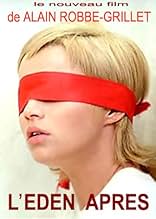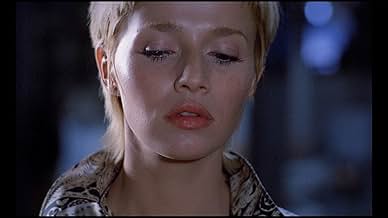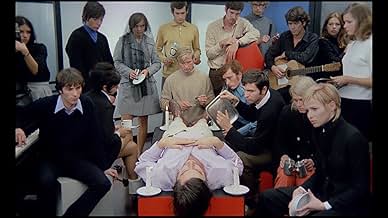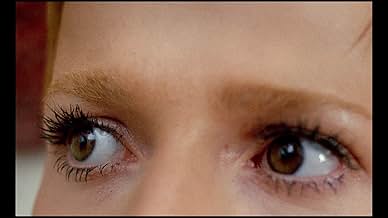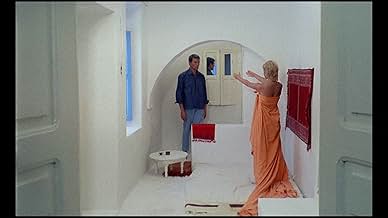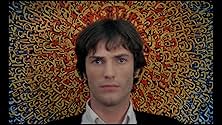IMDb-BEWERTUNG
6,4/10
1485
IHRE BEWERTUNG
Füge eine Handlung in deiner Sprache hinzuA group of French students are drawn into the psychological and sexual games of a mysterious Dutchman. Once they sample his "fear powder" the students experience a series of hallucinations.A group of French students are drawn into the psychological and sexual games of a mysterious Dutchman. Once they sample his "fear powder" the students experience a series of hallucinations.A group of French students are drawn into the psychological and sexual games of a mysterious Dutchman. Once they sample his "fear powder" the students experience a series of hallucinations.
- Regie
- Drehbuch
- Hauptbesetzung
- Auszeichnungen
- 1 Nominierung insgesamt
Jarmila Kolenicová
- Sonia
- (as Jarmila Kolenicova)
Ludovít Króner
- Franc
- (as Ludwik Kroner)
Eva Luther
- Violette's look-a-like
- (Nicht genannt)
Empfohlene Bewertungen
If this were in English, you might think it was a particularly pretentious student film by some young director who wanted to get as many pretty women to submit to dubious situations as he could. Rather, it is the epitome of why even many French filmmakers turned to American features to revive their own cinema which so often veers towards this kind of aimless, flimsily produced exercise in some indistinct intellectual exploration. What is going on? Well, apparently some bored very bourgeois students are trying to find ways - literal or fantasized, it's not clear which - to spice up their boring hours in the school hangout (realistically portrayed as the kind of sterile glass and colored panelled institutional space many are). There's a kind of an older Svengali figure who leads them some semi-comprehensible, vaguely erotic games. There are references to death, self-inflicted or other. There are a number of beautiful shots of whitewashed buildings against blue skies in North Africa. You get a few women in cages (mysteriously keeping on blindfolds thought their hands are free) and one recurring fleeting shot of what looks like some serious bondage, a touch of David Lynch-style soft-porn lesbianism - something for everyone really who likes this kind of film at all, with no particular order or logic.
If you loved "Last Year at Marienbad", you might at least find this film intriguing. Otherwise, you might be relieved that French directors changed direction enough to come up with "Diva". ("Does this review contain spoilers?" They should probably come up with a prize for anyone who could MANAGE to write a spoiler for this film.)
If you loved "Last Year at Marienbad", you might at least find this film intriguing. Otherwise, you might be relieved that French directors changed direction enough to come up with "Diva". ("Does this review contain spoilers?" They should probably come up with a prize for anyone who could MANAGE to write a spoiler for this film.)
I knew of novelist Alain Robbe-Grillet chiefly by virtue of his script for Alain Resnais’ art-house masterpiece LAST YEAR IN MARIENBAD (1961; which I intend to revisit in tribute to the author). Eventually, I became aware of his own films as a director via a thread on “The Latarnia Forums” – which, back then, had intrigued me a great deal and, in fact, was highly pleased to acquire three of them a few months ago. Unfortunately, the prints were incredibly murky – so I kind of lost my enthusiasm and it’s only now, in honor of his passing, that I made a concentrated effort to stick with them!
However, my first encounter with these titles proved a disappointment: as I said, the picture quality left a lot to be desired – but, frankly, so did the film itself! Judging by the celebrated Resnais work, I knew I’d be in for an oblique and possibly multi-layered piece – however, to be honest, I found it made little sense and that it was generally weird for weirdness’ sake! In fact, if I had to compare Robbe-Grillet’s style here with that of contemporaneous film-makers, I’d say this is Godard meets Antonioni meets Jodorowsky!; that, in itself, would sound like a most interesting proposition to some…but, I assure you, the film is a bit of a bore despite plenty of nudity (the writer-director seems to have a thing for sadomasochism, as can also be seen from TRANS-EUROP-EXPRESS [1966]) and a stunning-looking heroine in Catherine Jourdan (sporting cropped blonde hair).
The plot, such as it is, has to do with a group of disaffected students who are shown a way out of their ennui (via a concoction he offers) by a man they meet at a café (the Eden of the title); Jourdan is supposed to have a night-time tryst with him at a factory but, on arriving for the appointment, she is intimidated by some of her fellow students and finds the man dead! Taking a clue from a postcard of an Arabian town found in the stranger’s pocket, Jourdan gets mixed-up in espionage (the MacGuffin in this case being a valuable missing portrait), games of a sexual nature, drug-induced hallucinations and murder; eventually, we come full circle and the story returns to the Eden and the arrival once again of the stranger...
However, my first encounter with these titles proved a disappointment: as I said, the picture quality left a lot to be desired – but, frankly, so did the film itself! Judging by the celebrated Resnais work, I knew I’d be in for an oblique and possibly multi-layered piece – however, to be honest, I found it made little sense and that it was generally weird for weirdness’ sake! In fact, if I had to compare Robbe-Grillet’s style here with that of contemporaneous film-makers, I’d say this is Godard meets Antonioni meets Jodorowsky!; that, in itself, would sound like a most interesting proposition to some…but, I assure you, the film is a bit of a bore despite plenty of nudity (the writer-director seems to have a thing for sadomasochism, as can also be seen from TRANS-EUROP-EXPRESS [1966]) and a stunning-looking heroine in Catherine Jourdan (sporting cropped blonde hair).
The plot, such as it is, has to do with a group of disaffected students who are shown a way out of their ennui (via a concoction he offers) by a man they meet at a café (the Eden of the title); Jourdan is supposed to have a night-time tryst with him at a factory but, on arriving for the appointment, she is intimidated by some of her fellow students and finds the man dead! Taking a clue from a postcard of an Arabian town found in the stranger’s pocket, Jourdan gets mixed-up in espionage (the MacGuffin in this case being a valuable missing portrait), games of a sexual nature, drug-induced hallucinations and murder; eventually, we come full circle and the story returns to the Eden and the arrival once again of the stranger...
This is one of the horror genre's most delirious, imaginative, nightmarish and disturbing films ever made, on the same vein of Andrej Zulawski's "Possession" and, to a lesser extent, Harry Kümel's "Malpertuis". Directed by Alain Robbe Grillet (who wrote the screenplay for the equally enigmatic "Last Year in Marienbad") does not disappoint in creating a suffocating dreamlike atmosphere, as he takes the audience, through the eyes of the protagonist, in a "Alice in Wonderland"-like trip, with a little Marquis De Sade twist. The story is told basically through striking, thought provoking imagery, with dialog kept to a minimum, something that can be very unappealing to some, but I found it particularly fascinating. We follow the Mia Farrow-lookalike Catherine Jourdan as Violet, who goes to Tunisia in order to find out the truth behind the strange death of a mysterious man she met at a bar (the Eden of the title) during one of her friends' drug-induced games. That's basically all I can tell you, because it's a film so difficult to describe in words, you just have to see it for yourself to understand. Grillet's script, just like the film's setting, is a twisted, mind-bending labyrinth of sexual deviance and murder, where nothing is what it seems. In fact, once you've seen it, exactly how much of the events actually did happen, and if so, what did they mean. As in "Marienbad...", Grillet haunts the viewer with many questions, which may or may not be answer within this maze of a film. As mentioned before, it may not be everyone's cup of tea, but if you like this kind of deliciously bizarre, surreal film that will undoubtedly leave you scratching your head long after you've watched it, this one is a must see. It's kind of hard to find, but it's really worth it.
Philosophical thriller or Post-Modern jigsaw or S&M skinflick - or all three at once - Alain Robbe-Grillet's first colour film is a dazzling, at times frustrating experience. Try to imagine Alice in Wonderland crossed with Story of O and you may get some idea of the perverse sensibility at work behind it. Starting off in a labyrinthine, mirror-lined nightclub called Eden, moving on to a disused factory with huge industrial vats full of sperm, ending up on the Tunisian island of Djerba - with, naturally, a detour through a jet-set torture chamber where glamorous naked women are crucified or suspended in cages - Robbe-Grillet takes his wide-eyed and waif-like heroine (Catherine Jourdan) on a spiritual and erotic odyssey to...what exactly? Sorry, but I don't know either.
Nor does Robbe-Grillet seem the tiniest bit inclined to let us in on the secret. According to a mysterious stranger (Pierre Zimmer) who breaks in on Jourdan and her jaded pals, it's something to do with transcending the limits of rational Western consciousness. Finding a darker and more primitive reality. "Break on through to the other side" - or so The Doors might put it. Intriguing enough in a drugged-up late 60s kind of way, but Robbe-Grillet's own personal "doors of perception" don't seem to open very far beyond a spot of mild flagellation, or some Emmanuelle-style sex tourism on a photogenic Third World beach.
At least the film is exquisite to behold. Its imagery is bizarre and erotic and disturbing. Catherine Jourdan - who went on to make even weirder movies with director/husband Alain Fleischer - is a lovely heroine in the tradition of the Marquis de Sade's Justine. She combines the doe-eyed fragility of a Mia Farrow with the icy blonde sensuality of a Catherine Deneuve. As her lover, Richard Leduc is undeniably handsome - but he seems far too sweet and mild-mannered for some seriously nasty sex-games with a blindfold and a bucket of scorpions. As for any ultimate meaning, you may or may not want to work that out. I suspect most of us would be happier not knowing.
Incidentally, Eden and After is one of Robbe-Grillet's MORE linear films in terms of plot - yet it's also one of his hardest to grasp. Perhaps there's a lesson to be learned from that, but - once again - don't ask me what!
David Melville
Nor does Robbe-Grillet seem the tiniest bit inclined to let us in on the secret. According to a mysterious stranger (Pierre Zimmer) who breaks in on Jourdan and her jaded pals, it's something to do with transcending the limits of rational Western consciousness. Finding a darker and more primitive reality. "Break on through to the other side" - or so The Doors might put it. Intriguing enough in a drugged-up late 60s kind of way, but Robbe-Grillet's own personal "doors of perception" don't seem to open very far beyond a spot of mild flagellation, or some Emmanuelle-style sex tourism on a photogenic Third World beach.
At least the film is exquisite to behold. Its imagery is bizarre and erotic and disturbing. Catherine Jourdan - who went on to make even weirder movies with director/husband Alain Fleischer - is a lovely heroine in the tradition of the Marquis de Sade's Justine. She combines the doe-eyed fragility of a Mia Farrow with the icy blonde sensuality of a Catherine Deneuve. As her lover, Richard Leduc is undeniably handsome - but he seems far too sweet and mild-mannered for some seriously nasty sex-games with a blindfold and a bucket of scorpions. As for any ultimate meaning, you may or may not want to work that out. I suspect most of us would be happier not knowing.
Incidentally, Eden and After is one of Robbe-Grillet's MORE linear films in terms of plot - yet it's also one of his hardest to grasp. Perhaps there's a lesson to be learned from that, but - once again - don't ask me what!
David Melville
I suppose an argument on whether or not "Eden and After" is a load of pretentious twaddle or a film with real substance could go on forever, but whether or not there is more than the typical late 60's/early 70's drugged-out pseudo-intellectualism here is irrelevant. I don't think Robbe-Grillet's intention is to make a 'Grand Statement' of any sort, "Eden and After" seems interested mostly in asking questions and provoking a response from the audience, as well as in its aesthetic sensibilities.
"Eden and After" has been described as a highbrow soft-core flick, not only in another IMDb comment but elsewhere as well, and it's a fair enough label- many of the images here, particularly in the last forty minutes of the film are certainly erotic, or at least obviously were to Robbe-Grillet. Robbe-Grillet has achieved genuine sensuality with his imagery. It's not porn, there's none of the visceral satisfaction of that sort of thing, it's actually evocative enough to earn the 'erotica' label, although the film certainly has ambition beyond that.
Indeed, dismissing this as a skin flick is a bit moronic; there's so much more here. It's a dark, captivating, occasionally nightmarish, and very interesting film. The sound mixing here is absolutely superb, much like it was in the only other Robbe-Grillet film I've seen so far, "Trans-Europ-Express", and the cinematography stunning, especially after the film shifts focus to Tunisia in its final act. This was Robbe-Grillet's first color film and the opportunity is not wasted- everything from the minutest detail of the design to the cast's wardrobe is a carefully-orchestrated visual extravaganza of bold colors, often used very well in the film to emphasize a point.
"Eden and After" is something special, and whether or not you like it you have to admit that it's a unique experience and that much of the imagery is jarring and very effective. For me it was one of the most intense and involving viewing experiences of my life and is already one of my favorite films, having viewed it twice in a row, something I have rarely ever done before. I can understand disliking this one, but you have to give it credit at least as an aesthetic achievement.
"Eden and After" has been described as a highbrow soft-core flick, not only in another IMDb comment but elsewhere as well, and it's a fair enough label- many of the images here, particularly in the last forty minutes of the film are certainly erotic, or at least obviously were to Robbe-Grillet. Robbe-Grillet has achieved genuine sensuality with his imagery. It's not porn, there's none of the visceral satisfaction of that sort of thing, it's actually evocative enough to earn the 'erotica' label, although the film certainly has ambition beyond that.
Indeed, dismissing this as a skin flick is a bit moronic; there's so much more here. It's a dark, captivating, occasionally nightmarish, and very interesting film. The sound mixing here is absolutely superb, much like it was in the only other Robbe-Grillet film I've seen so far, "Trans-Europ-Express", and the cinematography stunning, especially after the film shifts focus to Tunisia in its final act. This was Robbe-Grillet's first color film and the opportunity is not wasted- everything from the minutest detail of the design to the cast's wardrobe is a carefully-orchestrated visual extravaganza of bold colors, often used very well in the film to emphasize a point.
"Eden and After" is something special, and whether or not you like it you have to admit that it's a unique experience and that much of the imagery is jarring and very effective. For me it was one of the most intense and involving viewing experiences of my life and is already one of my favorite films, having viewed it twice in a row, something I have rarely ever done before. I can understand disliking this one, but you have to give it credit at least as an aesthetic achievement.
Wusstest du schon
- WissenswertesItalian censorship visa # 57570 delivered on 5 February 1971.
- VerbindungenEdited into N. a pris les dés... (1972)
Top-Auswahl
Melde dich zum Bewerten an und greife auf die Watchlist für personalisierte Empfehlungen zu.
- How long is Eden and After?Powered by Alexa
Details
Zu dieser Seite beitragen
Bearbeitung vorschlagen oder fehlenden Inhalt hinzufügen

